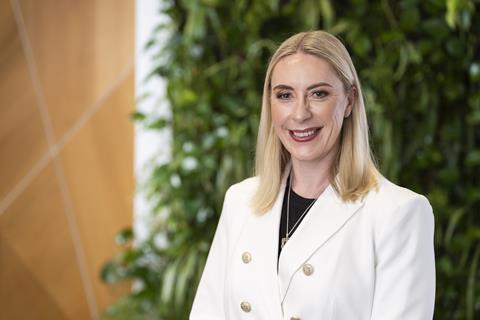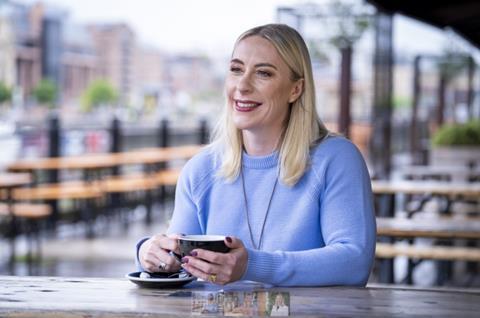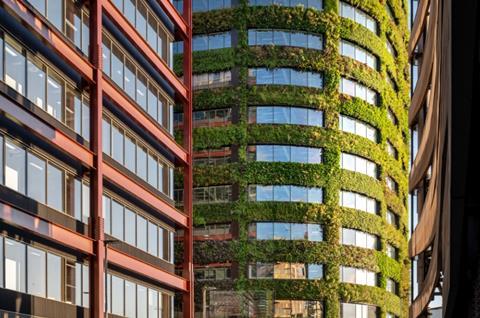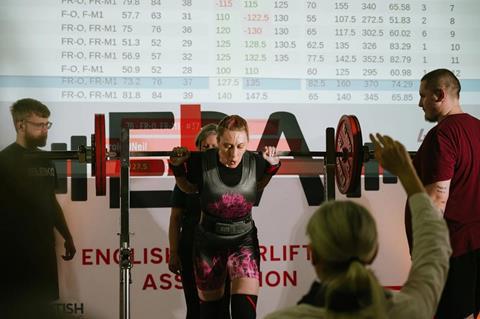Cundall is rapidly making a name for itself in the world of sustainable engineering and design. Managing partner Carole O’Neil shares her strategy with Carl Brown

Carole O’Neil has seen a fair bit of the world. “We moved around quite a lot when I was growing up,” she says. “My parents are both British, they are both from the North-east of England originally, but growing up we spent time in Europe – Belgium, Paris, Germany – and over in the Far East, Malaysia, South Africa…”
O’Neil is reminiscing about a childhood during which she spent a lot of time overseas as her father was a QS for an international construction company and later a commercial manager in the oil and gas industry. She was later sent to a boarding school in the North-east of England as her parents sought to ensure some continuity in her secondary education.
Fast forward a few decades and O’Neil is looking internationally again, this time as managing partner at Cundall, a fast-growing multi-disciplinary engineering consultancy with around 1,200 employees and 26 offices around the world. The firm, which is well-known for its focus on sustainability, is looking to derive a greater proportion of its income from abroad.

Almost two years to the day since she took the role, O’Neil sits down with Building to explain her strategy for the consultancy, which was last year 26th in Building’s Top 150 Consultants rankings of firms by UK fee income.
We begin by talking about the firm’s growth. O’Neil says Cundall is expecting to report turnover of around £100m for the year ending 30 June, 2024. This compares with £95.4m the previous year and £79.7m the year in 2022.
The firm in total has grown its revenue from £60m to around £100m in just five years – growth of 66% or two-thirds. Last year the company increased its pre-tax profit from £10.8m to £12.2m.
Key to the strategy behind this growth has been the engineering and design firm’s international focus.
“Broadly speaking, our revenue has probably been 55% to 60% UK and Ireland and then the balance in the other regions. We have an aspiration to get it closer to 50-50 and we’ve made quite a lot of progress over the last five or 10 years with a much more significant proportion of our growth coming from regions outside the UK,” O’Neil says.
We’ve certainly seen a slowdown in the UK over the last period. Significant growth is likely to be in other parts of the world
She adds that a lot of the firm’s recent growth has taken place within the Asia-Pacific (APAC) region. “We are not doing a massive amount of civil engineering in APAC or Australia but we are certainly doing quite a lot of structures in that part of the world. We are doing a lot of MEP, and a lot in the technology space and corporate real estate.”
Cundall is building up its specialist teams in areas such as vertical transportation, lighting design, acoustics, planning and security. Within the past two years, the firm has opened offices in Bangaluru in India and Manila in the Philippines, to complement its existing bases in Singapore, Hong Kong and Australia.
The consultancy’s recent APAC activity includes providing sustainable design and net zero carbon consultancy for Japan’s first net zero commercial high-rise building, known as CURA, which contains onsite solar power, delivered by the client Grosvenor Asia Pacific and the architect Doone Silver Kerr. Cundall also provided building services and engineering services for China’s 35,000sq m Xixian Orange Sky Mall.
| Global turnover in 2023 | |
|---|---|
| Middle East and North Africa | £9.5m |
| UK | £46.7m |
| Australia and Far East | £19.8m |
| Americas | £0.9m |
| Rest of Europe | £18.6m |
But why the focus on growing in these areas as opposed to the UK? In part, says O’Neil, it is about “building our delivery capability in locations where it’s perhaps a little bit easier to source talent than it is in some of the other places that we’re operating.”
“We’ve certainly seen a slowdown in the UK over the last period. I mean, the economic climate has been challenging.
“We’ve had a technical recession towards the end of last year. And I think that the growth – the significant growth – is likely to be in other parts of the world.”
In addition to the new offices in APAC the firm also opened one in Saudia Arabia last year and the attention is to grow and recruit further.

O’Neill says that availability of talent is “one of the biggest challenges” that construction faces in the UK. “The skill space in the UK and ability for employers to hire people with the skills they need has not got any easier post-Brexit,” she says.
“Difficulties bringing people in from Europe, further restrictions on visas and changes to the immigration regime have made that more challenging. With the escalation of salary levels we need to pay to sponsor workers – it’s a real sort of hotch-potch of things.”
Cundall does not, however, appear to be sitting back, resigned to these difficulties. O’Neil says the firm has responded by adopting a “blue ocean” strategy to nurture talent, making use of the fact it operates in multiple sectors and disciplines to give younger people the opportunity to work on different types of projects and try learning different skills.
“When people are starting to develop project management skills as they move up through their careers, you are not going to give them a massive, multimillion-pound project to manage. But, if you can give them bits of budgets or smaller projects in particular sectors and mentor them through that, it helps them develop that broader skill space they are going to need,” she says.
Carole O’Neil CV
2022- Managing partner, Cundall
2007-22 Partner, Cundall
2005-07 Human resources manager, Watsop Burton LLP
2003-05 Human resources development manager, Dickinson Dees
1993-2003 Training and development manager, Dickinson Dees
While the availability of talent is clearly a source of frustration, another area that O’Neil feels is a challenge in the UK market is the lack of certainty over net zero. “There needs to be a clear statement of ambition [from the government] in terms of what the timescales are for this,” she says.
“And then I think we need some clarity over how it’s going to be funded.”
Net zero and sustainability is a particular focus for Cundall, which in recent years has rebalanced away from MEP (which O’Neil says was traditionally the “chunkiest” part of the business) towards sustainable engineering and design solutions.
She says she believes that consultants such as Cundall can do a large amount to drive change and tackle perceptions in this space.
“The impact that we have from an environmental carbon perspective is huge, so the impact that we can have to make it better is equally huge.
“It doesn’t always have to be more expensive to create a sustainable building than a less sustainable building, but there is still a perception among some commentators that, you know, it’s expensive and potentially a bit of a luxury.”

As an example, Cundall cites its Eden New Bailey scheme, in Salford. The 12-storey office scheme, developed by the English Cities Fund (a joint venture formed of Muse, Homes England and Legal & General), was the first building in the UK to achieve a 5.5 NABERS “design reviewed” target rating.
“The journey the team went on there was really interesting because they set out wanting to create a sustainable building,” O’Neil explains. “But actually, with a few tweaks here and there, they managed to create a really sustainable building, one of the most sustainable office buildings in Europe.”
According to Cundall, WELL building standard principles were adopted for Eden New Bailey to develop a “building that is net zero carbon in operation and designed to enhance occupancy health, wellbeing and productivity”. The design includes a “living facade that will remove air pollutants, reduce urban temperatures and improve biodiversity, while providing biophilic health and wellbeing benefits to the users.”
Another area of the sustainability space that O’Neil believes Cundall can take the lead on is demonstrating the need for regulatory changes through its use of operational usage data from the buildings it has designed. She uses the example of schools.
“Some of the standards for electrification of schools are probably falling behind what is actually possible with the technology that we have available today.”
She says that the power output schools are required to have is “completely unnecessary. If you don’t need that level of power output for a school, a move towards electric is much more achievable.”
However much Cundall attempts to provide leadership in this space, O’Neil stresses again that the government needs to do more. “There needs to be some kind of positive impetus from government because there’s only so much we can do.”
Listening to O’Neil about her enthusiasm for creating sustainable buildings one would be forgiven for thinking that construction was a lifelong passion. But she came into the industry through a slightly unusual route: human resources, otherwise known as HR.
We give people a lot of autonomy to shape their own careers and shape their own destiny, we are very, very collaborative
Originally she set out to train as a lawyer and did a law degree at university, but decided after graduation that she did not want to practise as a lawyer. Instead she applied for an HR role for a law firm, and did “generalist” HR work before eventually joining Cundall as HR director to “build out its people function”.
As it grew, she eventually joined the firm’s management board, then became a partner before being promoted to her current role as managing partner two years ago.
So how has this background in HR equipped her for her current role?
“When I stood for election as managing partner a couple of years ago, it was very much on a platform of preserving and protecting the culture and everything that is good about Cundall, because I think it does have something unique in the industry, and it’s hard to articulate because you have got to be here and feel it and see it,” she says.
When urged to have a go at articulating it, O’Neil says: “I think it [the culture] is entrepreneurial. We give people a lot of autonomy to shape their own careers and shape their own destiny. We are very, very collaborative.”
Powerlifting hobby

Outside of work, O’Neil likes to compete in powerlifting tournaments. Last month she qualified for the Commonwealth championships, which will take place in South Africa later this year. She was crowned English 3-Lift champion at the English national championships.
At the time, she said: “I had a bit of a reset in my powerlifting goals in summer 2023, with a change of coach and a new approach to a few things. As 2024 is a Commonwealth year, I had a few goals that I wanted to hit. Saturday’s competition was the culmination of eight months of hard work in and out of the gym, and a solid focus on those goals.”
She describes the culture as “very much not hierarchical”, with forums to allow people to contribute to the firm’s strategy. “One of the things we talk about is this concept of ‘one Cundall’ – we want Cundall to kind of feel the same wherever you are in the world, whether you are sitting in Sydney, in Dubai or in Manchester.
“A lot of that is built on relationships. We invest an awful lot of time and effort and money in bringing people together at all levels.”
O’Neil insists that it is a “coincidence” that has she has ended up in construction operating internationally, just like her father did. But she recognises that the experience has given her certain advantages.
“The background I had probably made me a little bit more comfortable than I otherwise might have been in taking advantage of some of the opportunities to go and work in other parts of the business.
“So just before covid for instance, I spent 18 months over in Asia. It was supposed to be five and ended up being 18. I just sort of hopped on an aeroplane and off I went.
“I think the background I had made that less of a daunting prospect than that might otherwise have been for sure.”
And, as Cundall seeks to drive growth in international markets, while implementing and preserving a “one Cundall” culture globally, all those years of moving around the globe as a youngster will surely now come in handy.
Additional reporting by Ariana Hashtrudi

























No comments yet